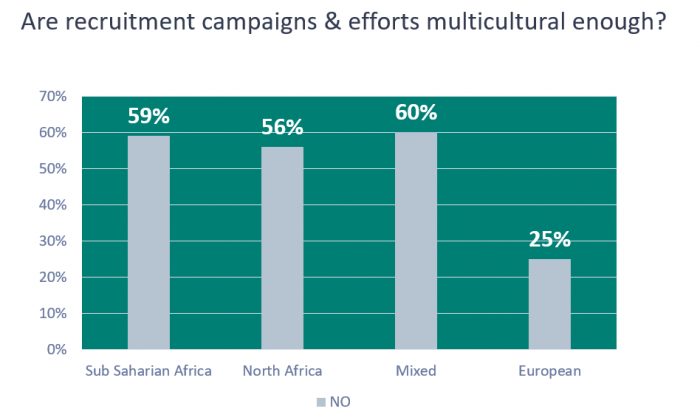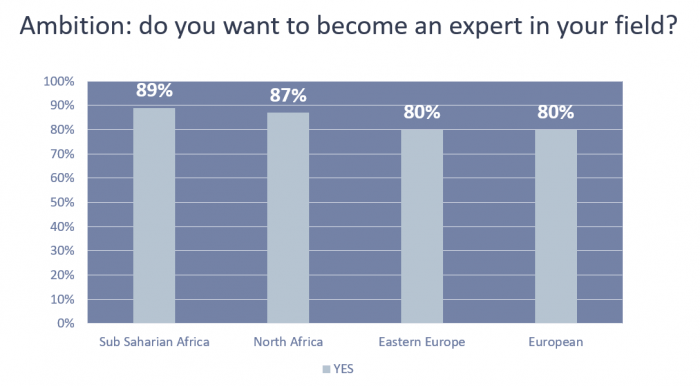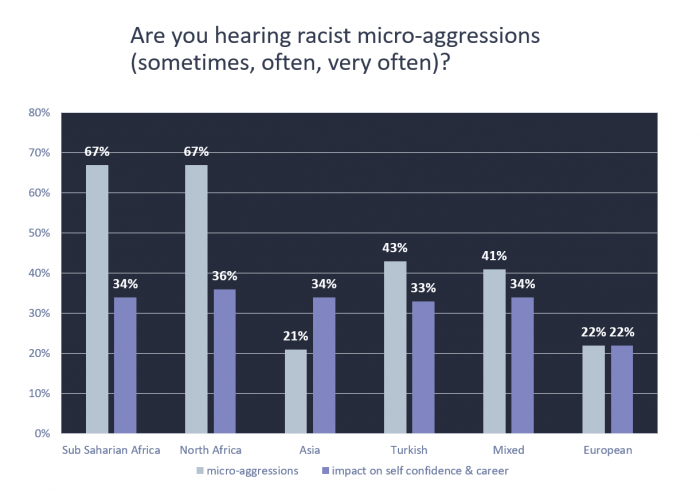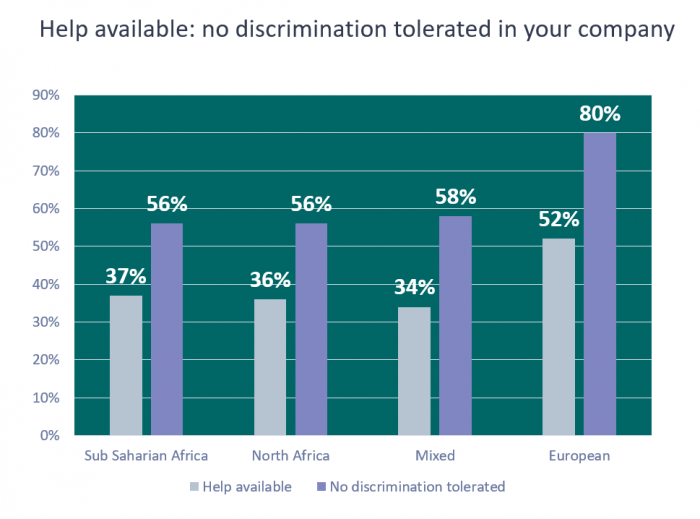The financial sector is setting up various campaigns for more diversity in its own ranks
9 July 2020 - 6 min Reading time
The survey on multicultural inclusion is part of broader diversity approach and shows room for improvement:
- The financial sector is committed to more diversity in its own ranks, in terms of gender, age, origin, etc.
- Last year Febelfin, together with various partners, launched the Women in Finance initiative to make the financial sector more gender diverse.
- Febelfin set up a survey to get an accurate picture of the existing perceptions of multicultural inclusion in the financial sector.
- This survey shows that:
- the diversity policy of the own employer is perceived differently depending on the origin of the employee.
- Belgian employees without foreign origins rate this policy more favorably than their colleagues with a visibly different origin;
- employees with roots in Sub-Saharan Africa and North Africa are much more likely to encounter racist micro-aggressions at work than their colleagues with a European background;
- employees - regardless of their origin - would like to become an expert in their field of work. Employees with a visibly different origin score slightly higher than their colleagues.
- Employees with a visibly different origin need more networking, mentoring and role models with whom they can identify. In response, the Multicultural Bankers Network was set up on July 2, 2020. Employees of every possible origin can attend events, but also take up a mentorship (or just be mentored).
- Febelfin is currently working on an inclusion campaign to support the financial sector in all aspects of inclusion. It will respond to sexism, racism and homophobia, among other things.
Those who work in a financial institution as a Belgian (or other Western European) usually give their employer good marks in the field of multicultural inclusion. About three-quarters of them think that the institution makes sufficient effort to recruit people of a different origin and that multicultural inclusion is an integral part of the policy.
However, this is perceived differently by people with foreign roots. More than half of them indicate that their employer can do more. This emerged from a survey conducted by Febelfin among 800 employees from the financial sector.
The survey is part of a broader approach by the sector to bring more diversity to its own ranks. The work therefore goes beyond a mere fact-check. For example, on 2 July 2020, the Multicultural Bankers Network was launched, which focuses on networking, mentoring and role models for employees of Belgian and foreign origin. By next year, a broad inclusion campaign will be rolled out again, which should provide financial institutions with tools to fight against sexism, racism and homophobia.
How is multicultural inclusion in the financial sector perceived?
In June of this year, Febelfin launched a survey on multicultural inclusion in the financial sector. About 800 employees from the financial sector gave their opinion, both male/female, NL/FR regarding the Belgian respondents and with a good overall mix in terms of various origins.
The following conclusions emerged from the survey:
- More than half of the employees with roots in Sub-Saharan Africa and North Africa indicate that the financial sector can do more to attract multicultural employees. About a quarter of employees with a European background are of the same opinion.

- Belgian employees without a visibly different origin think that their financial employer is quite multiculturally inclusive. A good 60% indicate that multicultural inclusion is officially included in the policy of the financial institution. Almost the same percentage actually experience it that way. However, both perceptions are rated much lower by people of a visibly different origin.
- The ambition to become an expert within their own professional domain is almost equally present in every employee, regardless of origin. The high score of at least 80% shows a high level of dedication. Employees with a visibly different origin score even higher here.

Employees with roots in Sub-Saharan Africa and North Africa are much more likely to encounter racist micro-aggressions at work than their colleagues with a European background: 2/3 versus 1/5. Those micro-aggressions are, for example, (misplaced) jokes, constant questions about origins or hurtful expressions. Colleagues make them, but also customers.

- The vast majority of all employees are convinced that their employer does not tolerate discrimination. However, this does not mean that everyone knows where to find the necessary information if they are confronted with this. This is especially true for employees with a visibly different origin.

What happens after the survey?
The survey offers Febelfin a better insight into the perceptions of multicultural inclusion, both among employees with local origin and among employees of foreign origin.
These results can serve as guidance when taking new initiatives to increase inclusion. The survey shows that progress can still be made in this area.
But of course Febelfin and the financial sector want to go further than checking perception. Previous working groups have shown that employees of foreign origin have a greater need for networking and mentoring. They are also looking for role models to whom they can mirror themselves.
To meet this need, Febelfin set up the Multicultural Bankers Network on 2 July. Given the corona times, the event went completely virtual, but in the future, the network will also become a physical meeting place for all employees from the financial sector, regardless of their origin.
A number of events will be organized annually and employees will enjoy two-way mentoring opportunities. In other words, they can get a mentor from the sector, but they can also mentor young people of all origins who are looking for a job. 2 non-profit associations make their expertise available for this: A Seat at the Table and Pour la Solidarité.
In addition, Febelfin is working on a broad inclusion campaign aimed at reducing the risk of sexism, racism and homophobia. This campaign will be launched on social media and within financial institutions at the beginning of 2021.
